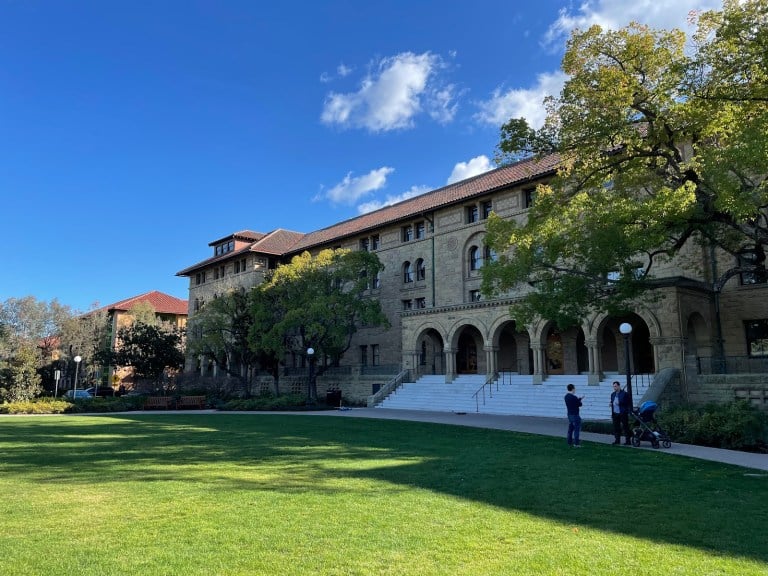“Know the enemy and know yourself, and you can fight a hundred battles with no danger of defeat.” — Sun Tzu, ancient Chinese general and military strategist
Regardless of whether you are an Economics or TAPS major, live in a co-op or EVGR, have never set foot out of the U.S. or come from across the ocean, the current Russian invasion of Ukraine has undoubtedly been one of the gravest matters occupying your mind and the inevitable destination of class discussions. The war reminds us that we should cherish the privilege of engaging in intellectual pursuits at Stanford and use our opportunity to arm ourselves with tools to better the world. This conflict has encouraged me and my peers to search for courses that offer an in-depth view into the war’s complex, multidimensional history and generally instilled in us a desire to gain diverse perspectives on world politics. However, scrolling through the course catalog, I found that the classes offered within the International Relations department — my desired major — that promise international perspectives are few, boiling down to the “Chinese Politics” and “Understanding Russia” electives.
From my past experiences, courses with titles promising a focus on politics from international perspectives are inadequate in truly offering us an understanding of current politics from the points of view of global countries. The theories we delve into are almost exclusively Americentric: we study the eroding civilian control of the military by focusing on how it manifests in the Pentagon; we learn about nuclear weapons’ effect on international security to draw conclusions regarding whether Washington should initiate further arms reduction. Little of my course material educates me on how other countries, especially non-Western ones, approach the same issues; often, these courses fail to consider cultural differences. This is especially ironic for me, a Chinese native who finds herself writing policy memos to train herself to think like American decision-makers.
With the mission to “promote the public welfare by exercising an influence on behalf of humanity and civilization,” Stanford should diversify its Political Science and International Relations curriculum to allow students to gain a more comprehensive worldview. While there has been a conscious effort across the country to incorporate the narratives of people of color into the literature curricula, exemplified by the Diversify Our Narrative program founded by Stanford students, multiperspectivism has largely been ignored in politics classes.
Bhu Kongtaveelert ’25, a native of Thailand, has been frustrated in his attempts at finding courses on Southeast Asia. “There is no political science class on Southeast Asia besides a course on human rights that examines the region with a savior complex,” Kongtaveelert said, adding that this is particularly frustrating given that “the high-tech market there has been burgeoning in recent years — I want to learn more about the global economic potential of my home.” He further criticized how the region is usually treated as a monolith of injustices and backwardness in the existing courses, which could only strengthen the students’ belief in stereotypes about Southeast Asia.
Nowhere is the need for diverse narratives more acute than in the Political Science and IR programs, which focuses on “allowing students to explore how global, regional and domestic factors influence relations between actors on the world stage.” Whether we will become global leaders or simply educated citizens in the future, the perennial wisdom in Sun Tzu’s words reminds us that we can only make informed decisions when we are familiar with the perspectives of both our adversaries and our allies. This understanding involves not only the facts but also the ways of thinking, which are the underlying assumptions and worldview beneath each person’s actions. The current crisis in Ukraine reflects precisely that — to comprehend and preempt Putin’s decisions, Washington needs to first have in-depth awareness of his decision patterns and the historical traditions that inform his perspectives. To better help Ukrainians meet their needs for security and survival, we need to familiarize ourselves with the nuances in their priorities.
This understanding cannot be gained through the one Ways – Engaging Diversity requirement that students must fulfill, or through the Chinese Politics and Understanding Russia politics electives that can easily be bypassed using other substitutes. The Stanford Political Science and International Relations programs should integrate the perspectives of other cultures into all of their courses, regardless of content or focus, in order to train students to become informed global citizens capable of empathy and educated decision-making. For students, this would increase representation of diverse narratives and allow them to better connect with those around them with different experiences. As an additional benefit, it would also give faculty members from more diverse backgrounds a chance to share their stories. When we have better access to information about those unlike ourselves, we can think outside the box and make unexpected connections and discoveries.
